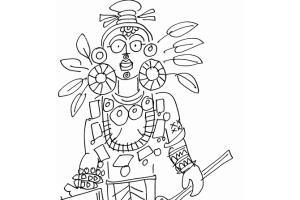Across India, there are thousands of tribal communities like the Bhils, the Gonds, the Dangs, the Veddas. Tribal communities around the world with different mythologies looking at the world very differently

Illustration/Devdutt Pattanaik
%20(1).jpg)
A few years ago, I had a confrontation with a senior newspaper editor, on stage, which quickly became viral and considerably popular. In the video, the editor insisted on equating Hinduism with Hindutva which is something I do not subscribe to. Nor do I subscribe to the idea that we can look at our country by excluding people, even distasteful extremists. Ultimately, we have to work together and live together.
In the course of this conversation, a young boy asked me a question, goaded by his parents, whether I was saying that science should not be taught to savages. I did not know how to answer the question, at that particular moment, because it revealed a particular mindset that has been part of the world, since colonial times. Here was a young child using the words 'science' and 'savage' as opposites of each other—as if science's sole purpose was the rescue of the said 'savage'. It is like looking at tribal communities across India, and implying that they need to be educated, indoctrinated into modern lifestyles to make them civilised. This civilising mission is called the White Man's Burden. It's adopted by brown people too.
And so the word 'Arya', which is used in the Vedas, refers to the civilised and polished man, the one who speaks Sanskrit, performs the ritual of yagya and respects Brahmins. It reveals a mindset that looks at the other, the non-Arya, as unpolished and raw and in need of education, in need Aryanising, i.e. civilising.
The question emerges: Is the purpose of education to transform a person's mindset to what we consider appropriately civilised? Or is education's purpose to expand minds, so that students can acquire life skills and make better sense of the life they lead?
Across India, there are thousands of tribal communities like the Bhils, the Gonds, the Dangs, the Veddas. Tribal communities around the world with different mythologies looking at the world very differently. There is an increased movement to educate them which means they are moving into government schools, where they are taught not tribal literature, tribal poetry, tribal art, tribal craft, but instead they aim to be civilised by learning the nation-state's language, the nation-state's stories, the nation-state's art.
However, one must point out that the nation-state is in itself not clear what constitutes nation-state: because if it is a superset with hundreds of subsets within it with different mythologies, then which mythology becomes the appropriate mythology of civilisation? Which mythology must be discarded as savage, which mythology must be considered indicative of civilisation? Must all tribal mythologies be replaced by a single 'civilised' mythology, such as the mythology of science, or mythology of secularism, or mythology of Hindutva or India? Why are we not allowed to appreciate each other's tribal mythologies? Why are we trying to replace the many with the one? And why is this one designed to look down on others?
We must remind ourselves: it is the 'savages' who have never abused earth and her resources. It is White Man and Brown Man civilising and 'development' mythologies that have resulted in the horrific climate change. It is these newer mythologies that have now brought the world to the edge of an abyss.
The author writes and lectures on the relevance of mythology in modern times. Reach him at devdutt.pattanaik@ mid-day.com
Catch up on all the latest Crime, National, International and Hatke news here. Also download the new mid-day Android and iOS apps to get latest updates
 Subscribe today by clicking the link and stay updated with the latest news!" Click here!
Subscribe today by clicking the link and stay updated with the latest news!" Click here!







